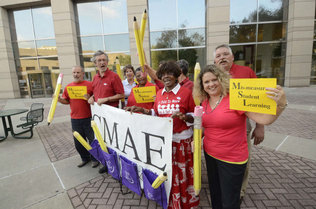Why the CMS Board of Education Should Stop the MSLs
This past Tuesday, a group of North Carolina parents and educators asked our local school board to stop giving a set of federally mandated tests known as Measures of Student Learning (MSLs).
Essentially, we are calling on our board members to consider civil disobedience. It is a lot to ask. But we believe the situation is dire enough to warrant it.
The MSLs rolled out this past spring with disastrous results, especially at high schools, where the bulk of tests debuted. They sucked time from instruction and further depressed already low teacher morale. Another round of high school tests is scheduled for this fall. It is the last thing our schools and students need.
The MSLs were created because North Carolina’s Race to the Top grant and No Child Left Behind waiver require our state to evaluate every teacher on “student growth” – essentially through some kind of test score. The U.S. Department of Education (USDOE) is requiring this massive shift even though it has no evidence that evaluating teachers on test score growth improves student achievement.
Because the standard state tests only cover English, math and some years of science, the requirement compelled North Carolina to create assessments for all the other subjects in the state curriculum – a monumental task for which the state had neither adequate time nor adequate funds. The first set of new tests was given in the spring. Additional tests were scheduled to roll out this fall.
The tests did not exactly inspire confidence.
Teachers found the tests poorly designed and badly written. As no money had been provided for grading, teachers at each school had to grade the tests themselves with no additional compensation. One testing coordinator estimated that grading absorbed six hours of the average high school teacher’s time. In addition, because the tests held no consequences for students, many turned in blank papers. The results are not going to be worth much.
Teachers, understandably, were furious. To make matters worse, even as they were busy carrying out a badly executed and largely unfunded mandate, our state legislature was busy cutting school staffs, ending teacher tenure and starting to dismantle the existing state salary scale. In the future, legislators proclaimed, job retention and salary increases would depend on “merit” – measured in part by the problematic tests that teachers were slogging through.
The problems with the MSLs were so bad that district leaders, including our superintendent, have joined with state officials to ask the USDOE for permission to slow the MSL rollout and look for alternatives. We’re glad that they are asking. But the outcome of that process remains far from certain.
Far too often, policy-makers have become so focused on the rush to attach test scores to schools and teachers that they have not taken the time required to effectively plan and evaluate new tests, while also failing to consider the damage that high-stakes tests leave in their wake. The U.S. Secretary of Education, Arne Duncan, is exhibit number one.
We saw this last week in California. Like many other states, California is in the process of transitioning to Common Core testing, and officials plan to field test the new Common Core exams next year. But when California legislators made the sensible decision not to give both the old tests and the new tests in the same year, Duncan went ballistic. In a letter, he threatened to withhold federal funds if the state did not give the old tests in addition to the new ones.
We saw a similar disregard for the effect of excessive testing on teaching and learning here in Charlotte three years ago, when then-superintendent Peter Gorman rolled out his own massive testing expansion. That spring, schools were required to give the time-consuming battery of hastily planned tests not once, but twice, so that the questions could be “normed” and the scores could count right away.
This disregard has consequences. As any teacher knows, giving a high-stakes test is not simply a matter of walking into class and handing out a test sheet. Such tests require preparation, proctoring, security, rearrangement of school schedules, supervised accommodations for students needing special assistance and more. They put stress on students and teachers. They divert significant amounts of time, money and energy from teaching and learning.
In our current educational climate, where historically low teacher morale combines with deep parent frustration over excessive testing, every additional test chips away at commitment to public schools. Every year, more of our best teachers decide that they have had enough. Every year, more families leave for private schools with more rational testing policies.
Giving the MSLs again this fall, despite the problems they caused, will only exacerbate this situation. It will be testing for the sake of testing, nothing more.
Someone, somewhere needs to show our teachers and our parents that their concerns about excessive and unproductive testing matter enough to warrant immediate action. We do not expect that kind of change to come from the top. This is why we turned to our Board of Education. We hope our Board will join us in taking a positive step here at the grass roots, where teachers teach and children learn.
Stop the MSLs.
The resolution on MSLs presented to the Board of Education of Charlotte-Mecklenburg Schools was a joint project of the Charlotte Mecklenburg Association of Educators and MecklenburgACTS.org. Residents of North Carolina can sign a petition supporting the effort at: https://www.mecklenburgacts.org/petition-msl/.

